News
Clogher Diocesan Synod 2008
Clogher Diocesan Synod 2008
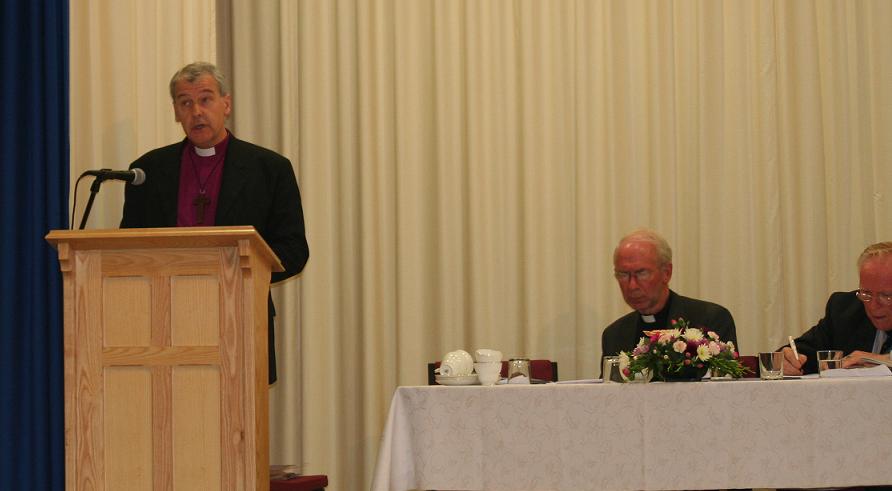 Bishop Jackson addressing Diocesan Synod
Bishop Jackson addressing Diocesan Synod
Synod was held on 25th September in Aghavea Parish Hall. It was preceeded
by a service of Holy Communion in the church at 4.30pm.
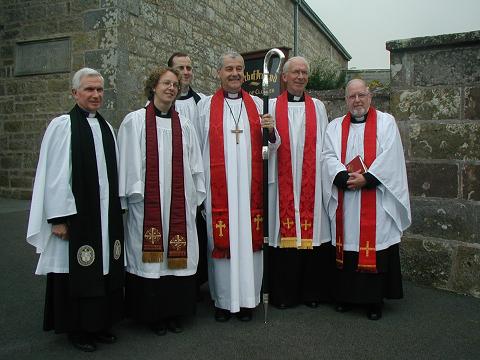
Canon Dennis Robinson, Revd Helene Steed, Revd Kyle Hanlon, Bishop Michael
Jackson, Archdeacon Cecil Pringle, Dean Raymond Thompson and after the Service
of Holy Communion
The large attendance then moved to the hall.
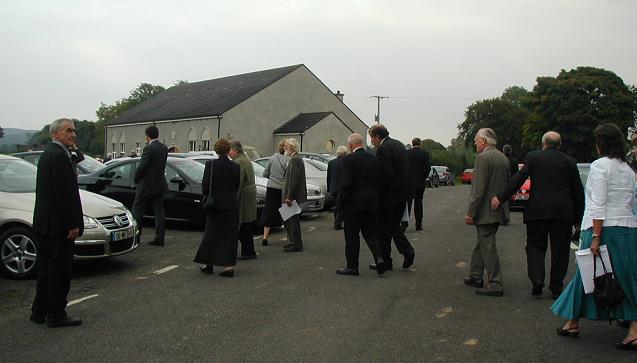
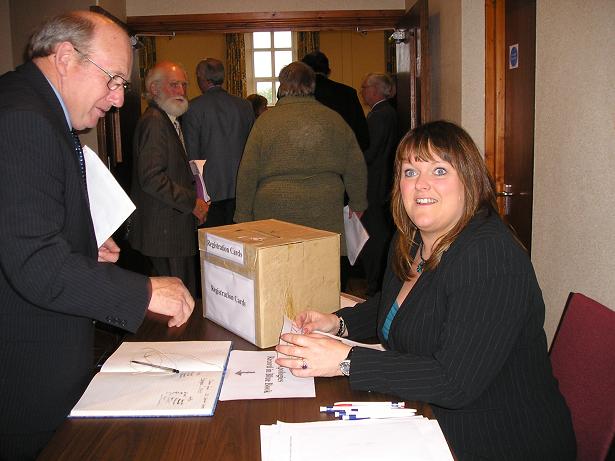
The main items of the evening were the address "Growth Unity and Service"
by the Right Reverend Dr Michael Jackson (see below) and the launch of the report Whatever
you say, say nothing
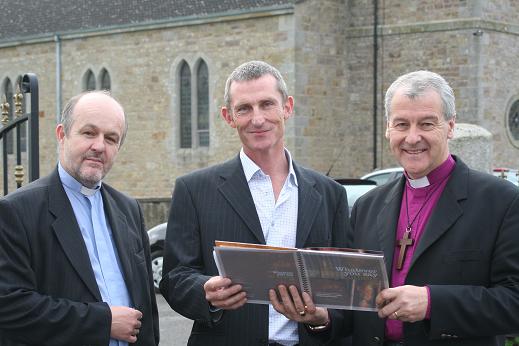
Revd Earl Storey of the Hard Gospel Project, Mr David Gardiner and
Bishop Michael Jackson at Clogher Diocesan Synod launching the report "Whatever
you say, say nothing"
The usual elections were held and reports given. Canon Riddel said over 300
people had attended sessions on "Confidently Safeguarding Trust"in
the past year. A motion to form a Union between the parishes of Errigal Truagh and Tyholland was passed. This had been requested by the parishioners. A fuller report will added shortly.
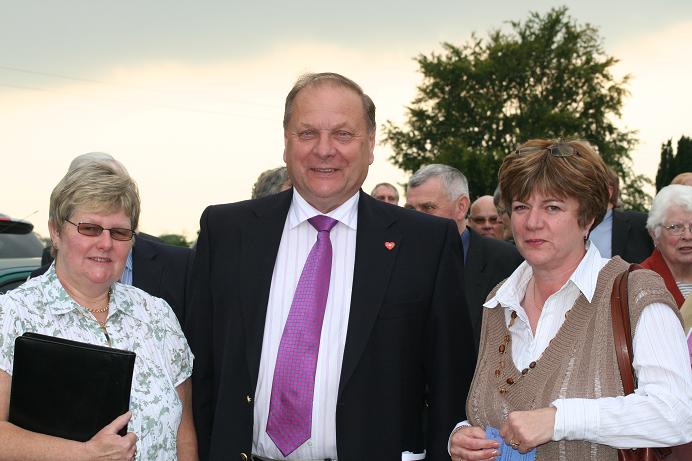
Mrs Joy Coalter, Mr George White JP and Mrs Doreen Primrose

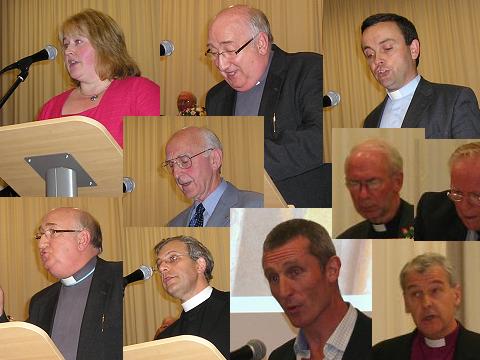
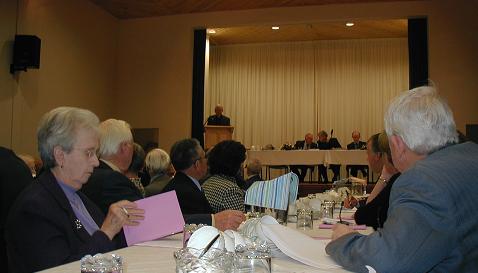
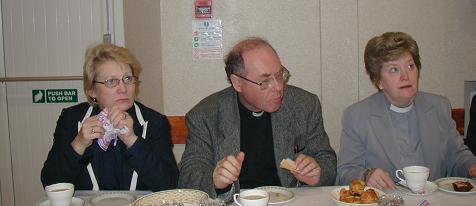


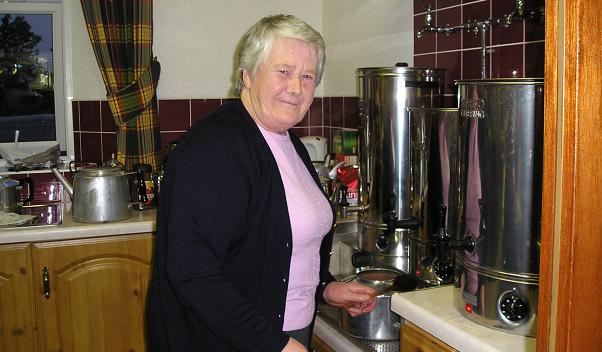
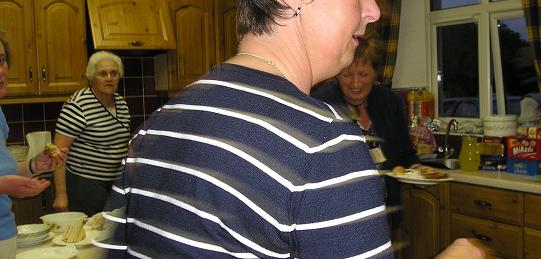
Address
at the Clogher Diocesan Synod held in Aghavea Parish Hall by the Right Reverend
Dr Michael Jackson on Thursday 25th September 2008.
… growth, unity, service …
MISSIONAL INTENTION AND SOCIAL ENGAGEMENT
INTRODUCTION
I begin, ladies and gentlemen, in welcoming you all to The Synod of Aghavea
2008.
During the year past, the bishops of the Church of Ireland have sought to
serve the church by drawing together ideas for the future in a number of areas.
Our hope corporately is that these may act as pointers and indeed stimuli to
future engagement on the part of members of the Church of Ireland in key areas
of Christian witness in the society of which we are part. They are more than
prose; we hope they will become practice.
Some of you may wonder how this came about. Others may wonder why I am telling
you about this. Others again may be saying: Sure, why are the bishops bothering
us like this, aren’t we grand the way we are? Others of you still may
have spotted the bishops’ Vision and Statement among your Synod Papers.
Two particular issues encouraged the bishops directly to address this area
and they were the following:
- the future training and equipping for ministry of lay and ordained people.
- the review of Committees of the General Synod undertaken by the Honorary
Secretaries and the Standing Committee.
All of this may seem removed from us here in Clogher. You may well think that
this is the proper work of Mr Harold Stewart, Canon Brian Courtney and the
Reverend Bryan Kerr who are the Clogher members of Standing Committee. (In
parentheses I say that it is an intense sadness to me that, alone of the twelve
dioceses of the Church of Ireland, Clogher has not in recent times had an under-45
lay person to serve on Standing Committee. This is a genuine gap not only in
the life of our diocese but in the total life of the Church of Ireland. Synodical
life has, as one of its purposes after all, the giving of a voice to the laity.
However, with a quota now retained in our triennial elections for under-45
representation to General Synod, I am pleased to say that this situation now
has the potential to be resolved positively.)
SYNODICAL LIFE AND EPISCOPAL ORDER – BEDROCK OF THE CHURCH OF IRELAND
Synodical life generally is fundamental to the life of the Church of Ireland
in a way which is consultative, progressive, proactive and courageous. When,
as indeed we experience for ourselves, the synodical principle is used to good
effect, it is a tremendous force for cohesion, friendship, solidarity and good
sense focused on the future. This is the Church of Ireland at its most dynamic.
It is a great pleasure to be here in Aghavea for this year’s Diocesan
Synod and all our expectations in this regard are being fulfilled. I thank
Canon Robinson, Members of the Select Vestry and all parishioners who have
worked so hard to make today such a welcoming experience and resounding success
for people from right across the diocese. We are indebted to you and applaud
your every effort. But I also have to say this: when, however, the synodical
principle is distorted by any wilful pushing of sectional agendas, by the opportunistic
defiance of the spirit of openness, and the downright human discourtesy of
content, we are, ladies and gentlemen Members of Synod, in a different world.
And we want to stay away from that different world.
The careful principle and practice involving the balancing of the numerical
strength of the laity, the pastoral conviction of the clergy and the derived
authority of the bishop – in three separate houses – was pioneered
by George Augustus Selwyn, first bishop of New Zealand in the mid-1800s, and
subsequently applied to Ireland in the 1860s. This was in order to implement
what we know as Disestablishment, a negative word for a positive way of life:
freedom of decision locally in our Province, combined with an affectionate
respect for the archbishop of Canterbury, and all set within an international
Anglicanism which even at that time had grown and was flourishing far beyond
the shores of England, its Empire and subsequent Commonwealth. In all our doings
and dealings with one another, the words of the earlier Richard Hooker, from
the seventeenth century, remain true and pertinent:
‘
A more beautiful and religious way for us were to admire the wisdom of God,
which shineth in the beautiful variety of all things, but most in the manifold
and yet harmonious dissimilitude of those ways, whereby his Church upon earth
is guided from age to age …’
STATEMENT AND VISION
It is into this synodical system and structure, which has been part of the
weave of the Church of Ireland for almost one hundred and forty years now,
that the bishops first at the General Synod of this year offered their Statement
and Vision. It is my pleasure to present it to my own Diocesan Synod today.
The Statement and Vision break down into three parts:
- Worship and Spiritual Growth
- Unity and Dialogue
- Living God’s Kingdom and Serving the World.
The three key words used to express this and summarize it are: Growth, Unity,
Service. One of the early reactions at Standing Committee to this was from
someone who said: ‘I see nothing in this about winning souls for Christ.’ In
fact, nothing could be further from the truth and the expectation of the honest
intention of this Manifesto of Mission and Service on the part of the bishops.
The wider stated purpose is one of developing growing – that is, actively
changing, not static or resisting – communities of faith where the Kingdom
of God is discerned, experienced, shared and made known. Maybe I have missed
something, but did Jesus Christ not come, was Jesus Christ not designedly sent
by the Father to bring in the Kingdom of God, to give to the human body and
soul a healing and an enlivening touch of divine reality? Is it not in these
communities of faith that the Kingdom of God in a primary way has been made
known – and from the beginning – in the lives of individuals through
the giving and receiving of preaching, teaching and healing? And are these
communities of faith not the places from which and to which souls are won for
Christ, world-wide, as we hear in the most extraordinary of life-stories happening
everywhere as indeed we speak? What is more, those who serve are to serve as
followers of Jesus Christ. With genuine missional intention, they are to go
out into the world to serve the same Jesus Christ to the glory of God the Father
in the love of the Holy Spirit. All of us are called to fulfil this mission
in our local setting, among the people we know and take for granted, in the
thick of neighbours and family, friends and foes alike.
THE WAY, THE TRUTH AND THE LIFE
For my own part, and I stress that this is a personal view, I see the Vision
Statement as an invitation from the bishops to all members of the Church of
Ireland to take hold of what they believe with confidence and assurance and
to go into their communities with faith in their hands and with hope in their
hearts. It is an invitation to engage actively, within and beyond our local
parochial communities of faith, with that great statement of Jesus Christ about
himself with which we are familiar from the Gospel of John14:6:
I am the way, the truth and the life.
The framework of John’s Gospel within which this statement of the essence
of God is set is that of God’s glory, a theme with which we are familiar
from the outset of the Gospel where we learn that God’s glory has come
to pitch its tent (John 1:14) among us, as indeed we are familiar with the
way in which such glory is part of the person and the being of Jesus Christ.
Within the mind of God, such glory was always intended to be something which
would make its true witness and proclamation through suffering leading to resurrection
and something which would have direct impact on human life as others live it.
This just is who God is and what God does. We call it variously: redemption,
salvation, grace. The concern, the commitment and the confusion of the disciples
about all of this are clear from the fact that so many of them – Simon
Peter, Thomas, Philip, Judas – ask different questions. But it is in
response to a question of Thomas who is asking in a literal, indeed innocent
sort of way for directions – something like the way we might today use
Sat Nav or Google – about the way, the route to take in following Jesus,
that Jesus sublimely replies in a deeply theological way and says:
I am the way, the truth and the life; no one comes to the Father but by me.
The fundamental point made by Jesus is that it is not possible to bypass either
(a) this way of suffering or (b) the person of Jesus Christ who is the earthly
embodiment in human form of God. And, as with so much in St John, this teaching
about Jesus is profoundly Trinitarian: Christ Jesus is the definitive way;
the Spirit is the definitive truth; the Father is the definitive life. But
the equally significant thing is that the disciples also can access God in
God’s fullness through the person of Jesus Christ as their master, their
teacher and their friend. And, as with everything good in Holy Scripture, this
treasure is not to be buried either in the soul of the individual person nor
is it to be guarded jealously by an individual community. It is to be shared
and shared again with those beyond the limitations and the confines of our
own varied selfishnesses. It is through being Christ-like in this way of giving
that we: win souls for Christ in the world as in the church.
I am the way, the truth and the life I myself see primarily as an invitation
to us to follow Christ and to be like Christ in being Scriptural in everything
we are and do. Throughout this invitation I see weaving their way three things,
all of which give this vision of Jesus for the church, which will come after
him, focus and direction. And I see it expressed tangibly in the Statement
and Vision of the bishops of the Church of Ireland. It happens through faithful
discipleship and Christ-like witness. These components are as follows:
- the way in which we model the person of Jesus Christ is through our worship
and our spiritual growth.
- the truth which both judges us and sets us free is firmly rooted in the continuity
of being between the Son and the Spirit; it calls for a united witness on the
part of all Christian people in order to enable us to dialogue with the world
and with those of other World Faiths.
- the life which comes from the Father for all creation is given in full abundance
through the Son. We are called to live it out in service with that sense of
urgency and energy which are hallmarks of God’s kingdom. That life returns,
and must be returned by us, through the Spirit, to its source, the Father.
All of this we can find in the three-part vision which the bishops have given
to us. The Mission Statement and Vision of the bishops also ties in with our
own diocesan review of Committees as part of a wider re-focusing of all of
our life on mission. The one quibble I have with the mode of expression of
the bishops’ Vision is that it relies on nouns and not verbs. At heart,
I am simply a practical person, seeking to make some sense of my believing
in God and helping other people to do the same, as best both of us can. For
that reason, I should have preferred: Growing, Uniting, Serving instead of
Growth, Unity, Service. However, I do accept that the three words which have
been used constitute outcomes, not process, and in a ‘talking church,’ a
church characterized by wordings rather than doings, outcomes are very important.
GROWTH
Deep in the heart of Anglicanism, that unique system of obedience to God’s
call and response to God’s goodness and grace, is worship. The Vision
Statement of the bishops expresses the aspiration of every person to praise
God. It also expresses the expectation which all too often is not voiced, taken
for granted and promptly forgotten: by this I mean that being a Christian is
a happy thing and a positive experience. Nurturing growth asks of us who have
been given the custodianship of God’s grace and salvation that we share
it joyfully with those who do not have it. The more familiar we are with the
content of our faith, the more urgent we ought to see the need to build communities
of faith who can and do enable individuals to form one body in Christ and rejoice
in being thus formed.
Often we are accustomed to assessing growth in terms of numbers. There is
no avoiding this, of course, as Disestablishment forces on us the need to pay
our way and to make ends meet with prudence and forethought and also to keep
in mind the possibility of less plentiful times. There is, nonetheless, also
another type of growth, what I might call growth in depth, growth in understanding
and growth in generosity and this growth is often lost sight of in a number-crunching
world. For us, worship – however simple, however splendid - gives voice
to this growing and ever-changing faith. But worship, more often than not,
is not something which explains itself. We really do need to get to grips with
it in both its modern and ancient forms because, throughout the history of
Anglicanism, worship is where we go to find our doctrine. Going to church unprepared
will mean both that we can put less into it and get less out of it. It is important
that a growing church be a welcoming church and that we keep our eyes firmly
on those who are newcomers and on those who are visitors. Again, the Statement
of the bishops uses the all-important word: attractive, without in any way
intending to be superficial, and challenges us to avoid being so settled or
comfortable with ourselves and one another that we do not even see the stranger
who is in our midst.
UNITY AND DIALOGUE
The church of God is called not to live for itself, otherwise it will continue
only to be another self-serving human institution, but to live beyond itself
and to engage with those who are significantly different – in the confidence
of its own unity. You may well agree with me that we have a long road to travel.
There are, of course, from earliest days many reasons for disunity and it is
from these early days of the first five centuries that we derive the language
of division and malfunction among Christians. I mean words such as: heretical,
schismatic, heterodoxy over against orthodoxy, and many other technical terms
which had largely passed into the mists of history. Words like these are again
doing the rounds. They are used rather loosely, rather too readily, in my opinion,
and with a degree of superficiality and destructiveness probably not even recognized
by those who give them voice but they corrode the morale, the trust and the
loyalty of church members.
CHICAGO-LAMBETH QUADRILATERAL
Let me take you back to the year 1888. One of the interesting aspects of our
living Anglicanism is the Chicago-Lambeth Quadrilateral. This is a gift of
the then young American Church (PECUSA) to the wider Anglican world which at
that time was being forced to think about what it was to be an Anglican beyond
the geographical boundaries of England. Originally conceived as a way of uniting
the American Church after the Civil War, the Quadrilateral comprised the following
parts:
(1) The Holy Scriptures - Old and New Testaments – as containing all
things necessary to salvation
(2) The Apostles’ Creed as baptismal symbol and the Nicene Creed as the
sufficient statement of the Christian faith
(3) The Two Sacraments of the Lord – Baptism and the Supper of the Lord
(4) The Historic Episcopate - locally adapted to the varying needs of the nations
and peoples called of God into the unity of his Church.
The Lambeth Conference which met soon after the issuing of the Quadrilateral
made this Quadrilateral the basis for unity on the part of the Anglican Communion
with any other church. This, in turn, has made possible in our own time the
exciting and life-giving Porvoo Agreement with the Lutheran Churches of the
Nordic-Baltic nations.
Any of us committed to or involved in this field of church life realize that
unity in Christ is not an ‘add-on’ but is an urgent imperative
embedded in being a Christian. At the same time, we sense that dialogue is
essential. Both of these words: unity and dialogue may well either alarm or
rouse little active interest in members of this Synod – I simply do not
know. If this is true, then I think that it is rather worrying. These issues,
these realities will not go away whether we want to engage in them or not.
The ‘other person’ is always there. But one thing I do know - our
experiences are as valid and as relevant as are those of the person in the
next diocese. It is a waste of that voice and of that experience if they are
not heard. I should be particularly surprised were dialogue really, at the
end of the day, so difficult a concept to live out because, properly used,
it offers opportunity to understand more of ourselves as others, through hearing
and questioning, seek to understand us. It is a mutual process of trustful
disclosure and is essential to a mature humanity. It has within it the capacity
to free us from the twitchiness which is always on the defensive and on the
attack at the same time. If the word: unity makes too many assumptions for
our liking, then the word: dialogue does not. It asks of us an honesty about
ourselves and an openness to others along with a confidence in ourselves in
speaking, in living and in sharing the things which matter to us in the company
of others - and then letting them do something similar. That is all it is asking
and yet so many people bristle at it and get up on their high horse to attack
it. Recently I have distributed to Members of the Diocesan Board of Mission
and to all clergy copies of a booklet produced by the Committee for Christian
Unity and the bishops on Inter Faith Encounter. This booklet explores a whole
series of practical situations in which, daily, Christian people encounter
people of Faiths other than Christianity. Such dialogue is also part of mission
today.
LIVING GOD’S KINGDOM AND SERVING THE WORLD
In its final section, the bishops’ Statement directs us to the prayer
which our Lord himself taught us, having first taught it to his twelve specially
chosen disciples. So often do we repeat, so instinctively do we say, The Lord’s
Prayer that we can all too easily fail to register both what it gives to us
and what it asks of us: living tomorrow today and living already within the
Kingdom of God. This involves and will continue to involve living beyond ourselves
in the exciting work of exploring God’s Kingdom on earth:
(1) We entrust the present and the future to God without knowing fully what
it contains when we call on God to let his will be done here on earth as it
is in heaven. And we do so in faith in the God of creation and of redemption.
(2) The translation to which we are accustomed suggests to us that we ask God
for our daily allowance, our regular allocation, of bread on this day. But
an equally valid, and to my mind perhaps even better, translation has us ask
for tomorrow’s bread today. This is the positive, forward-looking, sort
of Christianity we could all do with re-discovering. And in re-discovering
it, we would re-discover the God of generosity and of deliverance.
(3) With stark realism we say with our own lips that we do not in fact expect
God to forgive us our sins in any other way than we forgive the sins of those
who sin against us. We do so in love for the God of forgiveness and of the
second chance. And at the same time, in our human way of living, we commit
ourselves to forgiveness of others in expecting forgiveness of us.
All of these three parts of the Lord’s Prayer could be expanded and
explored further, but I simply wish to draw to our attention the ways in which
discipleship of the one Lord is always before us and within us. Too often discipleship
is lost and squandered because we feel we cannot keep up with its demands.
But just as important as what we do is how other people respond to us. Never
were we expected to do all of this on our own. Hence the emphasis which the
bishops give to service of others, recognizing that herein lies our richest
reward and deepest satisfaction as we seek to be disciples and to make disciples.
We are asked, called and invited to engage with the world in its rich variety
of need and opportunity.
MISSIONAL INTENTION AND SOCIAL ENGAGEMENT
Perhaps it is the overwhelming loss of confidence which many individuals have
in the worth of their own contribution; perhaps it is the equally overwhelming
upsurge in suspicion which many individuals have in the value of institutions;
and perhaps it is a combination of both which has forced the church once again
to explore mission as something local and, dare I say it, as something which
seems less exotic. At home, as much as abroad, we are called to let ourselves
be every bit as much a place of mission for others as we may expect others
to let us offer mission to them. Mission cannot be imposed. We are called to
a mutuality of mission which, in the minds and actions of those involved in
today’s Mission Agencies and Partnerships, has already overtaken and
replaced ideas of superiority and dependency, the bountiful and the destitute,
as sufficient in themselves to explain what mission is - however well disguised
- in Christian thinking.
Perhaps, again, it is the ever-increasing suspicion of governments and party
politicians as people who look first and foremost to their own re-election
and perpetuation in privilege which has forced the church to dig deeper and,
in a quest for meaning in itself as another human institution in danger of
being no more than just another human institution, to ask the question: Who,
then, is my neighbour? In this way the church has begun again to waken up to
its current disconnectedness from society. It is the primary calling of the
church to be sent by God and to be found among other people. And God alone
knows the limits and definitions of that word: other. This is the primary thrust
of the bishops’ Statement and its invitation to us all to do three things:
to grow, to unite, to serve.
MISSION, MACARTAN AND WHATEVER YOU SAY, SAY NOTHING …
A number of things has happened in the last number of months to put in place
what might be called the building blocks of a missional approach to diocesan
life. These build on work and witness previously offered in the diocese and
by people who have had what is referred to as a passion for mission. One is
the desire to review and to revise the Diocesan Committees with mission firmly
in view and in focus. Across the diocese, continuing members and fresh faces
have volunteered to serve on the Committees of the diocese. Only last evening
we had the second in a series of meetings equipping members of those Committees
to think and work in a missional direction. My thanks go to Mr Ian Smith and
Mr James Price of CMS Ireland for what they have done for and with us. But
none of this should be a surprize to anyone here. MACARTAN 1500 and MACARTAN
1500+ have already prepared the ground across the diocese for a more confident
sense of engagement with everyone on the part of members of our diocese. So
also have the many visits to our diocese by bishops and others from across
the width and the breadth of the Anglican Communion. The Clergy Conference
2008 was led by the Reverend John Kafwanka from Zambia. John had been seconded
for a period to the Anglican Communion Office, London to prepare for the Communion
a Lambeth Conference focused on Anglican identity and the work of bishops in
God’s mission. My own work over almost five years with NIFCON (The Anglican
Communion’s Network for Inter Faith Concerns) also provides a perspective
on the real presence of people of World Faiths other than Christianity in Ireland
and across the Anglican Communion.
LOCAL AND INTERNATIONAL
One of the important things I wish to encourage us all to think clearly about
from a Christian and a Church of Ireland perspective - generously, critically
and towards the future - is that mission is local as well as being international.
It is in such a context as this that I welcome the Report: Whatever you say,
say nothing … which has been researched and compiled by Mr David Gardiner.
David was commissioned to undertake the research by The Hard Gospel Committee
of the Church of Ireland. It is specific to Clogher Diocese and we are the
first diocese in Ireland to break fresh ground in the quest for understanding
and mutual respect in what I might call: the invisible questions. I have every
confidence that, although particular to our own beloved diocese, it will resonate
by its honesty of insight into every corner of the Church of Ireland and beyond.
If, ladies and gentlemen Members of Synod, I may presume to offer a personal
observation, I feel that in many ways it shows how The Hard Gospel Project
has matured over the years. I sense too that, as a diocese, we have a unique
offering to make to the understanding of the: Whys? and the: What nexts? of
the unprecedented time of peace which Northern Ireland is now in a position
to share with the whole of Ireland. It is every bit as vital as anything politicians
may yet - and we are still waiting – get round to offering us as a society
for the future. It is, therefore, at this Diocesan Synod 2008 that I speak
of a new era of hope.
I am, and indeed we all are, indebted to the Reverend Earl Storey, Director
of The Hard Gospel Project and all Members of the Committee, for this electrifying
piece of work. I am indebted also to Mr David Gardiner for the way in which
he carried out the research among people of the diocese, how he showed both
sensitivity and courage, how he analyzed his findings and how he has given
so generously of his time and expertise to this project. The fact that the
Director of The Hard Gospel Project is a son of Clogher Diocese is surely a
source of pride to so many of us. Later in our Synod today, the Report: Whatever
you say, say nothing …will be launched. What in the Anglican world we
call: the process of reception will then begin.
NEW CLERGY AND NEW INITIATIVES
A number of new clergy began work and a number of new initiatives has taken
place in the diocese since we met at The Synod of Clabby in 2007. Miss Naomi
Quinn began work in the Ematris Group of Parishes in the autumn of 2007 working
closely under the supervision of the Reverend Robert Kingston. Naomi came to
us as an experienced Diocesan Reader from Kilmore, Elphin and Ardagh and has
settled quickly into the life of the Grouped Parishes and the diocese. She
is also now an ordinand and has embarked on the Foundation Year for the new
Master in Theology degree. In November 2007 the Reverend Colin Bell was instituted
to the Aghadrumsee Group of Parishes. Colin had served in the diocese before,
having been incumbent of Colaghty Parish from 2000 to 2002. I know that Colin
looked forward greatly to returning to work in Clogher Diocese and during his
brief tenure he carried out the work of Rural Dean of Clones. Regrettably things
changed and Colin resigned at the end of July 2008. We wish him and his wife
and family well in what life holds next for them. The Venerable Cecil Pringle
resigned as incumbent of Rossorry Parish in early 2008 after twenty-seven years
of unbroken and assiduous ministry. Continuing as archdeacon of the diocese,
he carries the responsibility for the Drumkeeran Group of Parishes. In February
2008 the Reverend Helene Steed was instituted incumbent of the Clones Group
of Parishes. Helene spent three years as Dean’s Vicar in St Fin Barre’s
Cathedral Cork after considerable experience of rural ministry in her native
Sweden. She is currently the only incumbent in the Church of Ireland through
the provisions of The Porvoo Agreement and, interestingly, as a Lutheran, is
a Member of the Anglican-Lutheran International Commission. This is a tremendous
distinction for her in her own right and we are honoured and delighted that
Helene serves in Clogher and continues in this significant international role.
The Reverend Margaret Pringle, after almost three fruitful years in the Clogher
Cathedral Group of Parishes, moved in April 2008 to the Donagh Group of Parishes.
She, like Naomi Quinn, works closely with and under supervision of the Reverend
Robert Kingston, Rural Dean of Monaghan. The Reverend Elizabeth Thompson has
been working in Enniskillen Cathedral Parish since the spring of this year
and the Reverend Alison Seymour-Whitely in the Clogher Cathedral Group of Parishes.
The Reverend Charles Eames, our most recently ordained cleric, works in Magheracross
Parish while continuing his secular employment. The Reverend Arthur Barrett,
still in his first month as rector of Rossorry, has come from the Diocese of
Elphin and is very welcome to our diocese.
The Reverend Alison Seymour-Whiteley was ordained priest on June 1st in St
Macartan’s Cathedral, Clogher where she serves. In St Macartin’s
Cathedral Enniskillen on June 11th the Reverend Charles Eames was ordained
deacon. Mr Simon Genoe expects to complete his training for ministry this academic
year and Mrs Lorraine Capper has entered the second year of training. Miss
Naomi Quinn and Mrs Stephanie Woods have embarked on the Foundation Year of
the new-style training of ordinands. The Reverend Stephen Farrell, from Dromore
Parish, was ordained by the archbishop of Dublin in his cathedral in June and
serves in Taney Parish, Dublin Diocese. We continue to appreciate the work
of retired clergy and Readers who make it possible for us all to be members
of a Diocese which runs with efficiency and where worship continues in a regular
cycle, availing of the talents of those who generously give of themselves Sunday
by Sunday. We are also very appreciative of the work of Diocesan Pastoral Assistants – a
form of ministry unique to the diocese of Clogher in the Church of Ireland
- who, as lay people, bring a richness of human experience to pastoral ministry
in parishes across the diocese. To all of you: Thank you.
To our Synod today we have pleasure in welcoming The Reverend Colin Dickson
and Mr James Cochrane of the Presbyterian Church in Ireland from the Cavanaleck
Congregation; The Reverend Joseph McGuinness of the Roman Catholic Church from
Enniskillen and The Reverend Daphne Twinem of the Methodist Church from Fivemiletown
as Official Guests. I trust that Members of Synod will join me in welcoming
you all, along with Sir Anthony Hart, Assessor, and we look forward to the
time which you will share with us this evening and your participation.
DIOCESAN OFFICE
I wish to record my sincere thanks and appreciation to Mr Ivan Beacom FCA
who has served assiduously as Diocesan Accountant for the period 2000 to 2008.
Ivan became known to us all for his meticulous attention to detail, his assured
grasp on paper of the complexities of the financial aspects of diocesan life
and for his willingness to work long hours on behalf of the diocese after a
demanding week’s work. Ivan, we are delighted that you are with us this
evening and express to you our heartfelt thanks.
Throughout this year, as last, we have been blessed by a very effective Diocesan
Office, a very efficient and pleasant group of people in Glenn Moore, Ruth
McKane and now our new Diocesan Accountant, Leslie Stevenson whom I also welcome
this evening. All three of them go the extra mile to help any who approach
them for information or for assistance. For six months of the year we also
had the pleasure of Walter Pringle who worked as the co-ordinator of MACARTAN
1500+Project. The MACARTAN Projects, now positively brought to a conclusion,
have made an invaluable and irreversible contribution to our profile and self-confidence
as a diocese in contemporary Ireland. In turn, we as a diocese have made a
contribution to the developing quest for a new type of community and society
in Northern Ireland and have been stimulated to fresh thinking and inspired
to fresh action in our everyday discipleship. My thanks are extended to the
Rural Development Council and the Fermanagh Local Strategy Partnership, along
with the Church of Ireland Priorities Fund, for their funding.
CONCLUDING REMARKS
I began by saying what a pleasure it is for us to gather this year in Aghavea
for our Diocesan Synod – and indeed it is. I went on to begin to explore
with you something of what it is to see the church as shaped for mission. In
my modest remarks, I have sought to draw out some of the possibilities embedded
in the Vision and Statement of the bishops, clustered as it is around three
words: growth, unity and service. These describe our calling as disciples of
our Lord and Saviour Jesus Christ. Calling to what? Calling, I suggest, each
and every one of us in our baptism, to follow and, in following, to be sent
again and again by God in God’s mission. The way, the truth and the life
- these words, familiar and too often tripping off the tongue – bring
us in St John’s Gospel to the heart of Jesus, to that essential and inescapable
linking of glory and suffering.
This linking of suffering and glory is not, as well you know, ladies and gentlemen
Members of Synod, something confined to the pages of Holy Scripture. It is
written deep in the hearts of everyone here and of everyone in the parishes
which we represent. Whether it be a fireside chair once occupied but now no
longer; whether it be a place at the kitchen table once buzzing with eager
conversation, but now no longer; whether it be someone with whom we worked
all our lives, no longer now sharing with us a few words in the evening before
we both head for home – in our own individual lives, one by one, we know
both the suffering and the glory. And this is precisely why the human experience
of Jesus Christ, the child of God and the child of Bethlehem, is so precious
and so powerful for us. It connects heaven and earth. It holds together life
and death. It gives voice to both glory and suffering. And it does so because,
under God, it unites cross and resurrection. And this is why we, in our day,
must respond to that call to follow, and in following, to be sent where we
never expected to have to go – in service and in mission to individuals
like ourselves to whom we belong in community.
The spirit of Clogher remains well encapsulated in the Collect for St Macartan’s
Day: building and strengthening of the church, Gospel proclamation and leadership,
reconciliation and peace in society in our time. These are all the bedrock
and the building blocks of mission in the church. To this we are called once
again in 2008. I ask you to pause in silence, seated as you are, as I say and
pray with you the Collect of St Macartan:
Heavenly Father, we thank you for Macartan, faithful companion of St Patrick,
and builder of your church in Clogher: Build up your church through those whom
you call to leadership in this generation and strengthen your church to proclaim
the gospel of reconciliation and peace; through Jesus Christ our Lord.
+Michael Clogher: 25.ix.2008
Date: 25 September 08